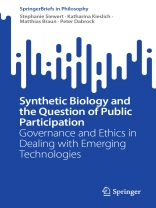The book considers the relationship between governance and participation, and the ways participation has been understood, framed and applied in the context of synthetic biology (SB) governance approaches. Based on fundamental questions about the scope, purpose, and responsibilities assigned to public participation activities, the authors conducted an literature review of policy reports and articles on SB governance. The authors identify key characteristics of synthetic biology, such as the complex interplay of research, engineering and IT expertise in the field, as well as the challenges these characteristics pose in designing governance frameworks. Drawing on insights from a literature review, the authors contest calls for “earlier” and “more” participation on the basis that such calls fail to consider the necessary structural adjustments and resources needed for such endeavors. The brief addresses ethical questions arising in synthetic biology that could be used for developing frameworks of governance in the ongoing COVID-19 crisis and the consequent innovations in vaccine research.
Table of Content
Introduction.- Imagined Futures: Trust and Justice in SB Governance.- Governance and Participation in Policy Reports of Synthetic Biology (Literature Review).- Approaches in Defining Governance, Challenges and Benefits.- Designing Governance Frameworks.- Governance of Synthetic Biology.- Governance and Public Participation.- Objectives.- Focus Areas Participation.- Communication.- Representation.-Evaluation.- Focus Areas Governance.- Resources.- Training.- Data Management.- Responsibility.- Case Study: COVID-19 Vaccine Development.- Conclusion.- Recommendations.
About the author
Dr. Matthias Braun serves as an Assistant Professor at the Chair of Systematic Theology II (Ethics) at the Friedrich-Alexander University of Erlangen-Nuremberg. His current research deals with questions of political ethics (the relationship between democracy, civil society and the rule of law) as well as with the ethical, legal and social challenges of new technologies (especially: Big Data, Artificial Intelligence and Genome Editing). In addition to scientific publications and national and international lectures, Matthias Braun has been able to attract and carry out numerous research projects.












